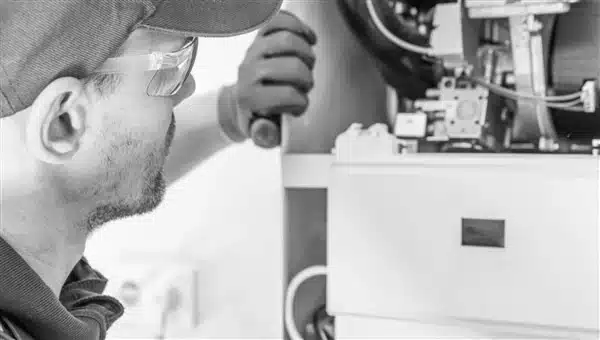As homeowners, we all know the pain of dealing with unexpected expenses, especially those related to plumbing issues. Whether it’s a leaky faucet or a malfunctioning water heater, the costs can quickly add up.
While there are times when you will need to call a professional, understanding the basics of your water heater and knowing how to troubleshoot some common issues can help you save on those costly repairs. Let’s dive into some tips that can help you cut down on your plumbing costs by troubleshooting your water heater.
Table of Contents
Understand the Basics of Your Water Heater
Picture this: You’re on a mission to become a bit of a DIY expert with your home appliances, and the water heater is the focus of today’s lesson. Before jumping headfirst into the deep end of troubleshooting, let’s first get to know your water heater and how it operates.
You’ll primarily find two types of water heaters in most homes: tank and tankless. The tank variety stores a significant volume of water within a tank, heats it, and keeps it ready for use. On the other hand, a tankless water heater is all about instant gratification, heating the water as it flows through the unit, offering hot water on demand.
But what fuels these heaters? It’s usually one of two sources: gas or electricity. Your water heater’s type and energy source will guide you in deciphering the potential hiccups you might encounter.
Remember, every successful troubleshooting mission begins with understanding the basic operation of the device. So, now that you’re familiar with the main players in your water heater’s performance, you’re well on your way to becoming a proficient water heater troubleshooter. The next step is to identify common issues and their tell-tale signs. Let’s continue on our quest to curb those plumbing costs!
Common Problems and Their Symptoms
Venturing into the world of water heaters can feel like exploring uncharted territories. So, let’s arm ourselves with knowledge and delve into the most common issues that your water heater might encounter. By being aware of these usual suspects, you can catch them early and avoid the hassle of more severe complications down the line.
One notorious issue that most homeowners have run into at some point is the absence of hot water. Imagine gearing up for a warm, relaxing shower after a long day, only to be greeted with a rude shock of cold water. This could be due to a rebellious thermostat, a defiant heating element, or simply an overworked, undersized tank trying to keep up with your family’s hot water demands.
Then we have those eerie noises emanating from your water heater, turning it into a haunt for phantom sounds. These could be popping, hissing, or knocking sounds that might make you jump in the middle of the night. More often than not, these are signs of sediment build-up in the tank or could indicate that the heating element is on its last leg.
Next on the list is scalding hot water. While a steaming hot bath might sound therapeutic, water that’s too hot can be a safety hazard and should not be taken lightly. This is usually an indicator of a malfunctioning thermostat setting that causes inconsistent water temperature.
Finally, we have leaks, the silent destroyers. The drips and drops around your water heater might seem insignificant at first, but they can gradually lead to water damage or even cause the heater to fail entirely.
Remember, knowledge is power. By being aware of these common issues and their symptoms, you can nip the problem in the bud before it turns into a full-blown crisis. However, don’t let this information scare you. In our next section, we’ll arm you with some basic troubleshooting tips to tackle these issues head-on. So, stay tuned and let’s continue on our mission to cut down those plumbing costs!

Basic Troubleshooting Tips for Common Issues
Alright, let’s roll up our sleeves and dive into some basic water heater troubleshooting tips. Are you ready? Let’s get started.
When hot water turns into a luxury you can’t access, it’s time to look at the power source. For those of you with electric water heaters, check to ensure that the heater is securely plugged in, and don’t forget to take a peek at the circuit breaker. An unplanned trip could be what’s keeping you from your warm bath.
If you’re rocking a gas heater, the pilot light should be your first stop. Ensure it’s on and functioning correctly. Remember, no pilot light, no hot water!
Next, we encounter the soundtrack of your nightmares – weird noises from your water heater. If it sounds like a kettle gone wild or a popcorn machine, it’s a clear sign of sediment buildup in the tank. Drain and flush your tank to clear out the debris and give your heater a fresh start.
Moving onto the other extreme – scorching hot water. It might sound ideal after a long, stressful day, but trust me, safety first! When your water feels like it’s fresh out of a volcano, it’s a sign your thermostat might be acting up. Check the thermostat setting. If it’s set too high, adjust it to a more skin-friendly temperature.
Last, but certainly not least, we have leaks. These pesky problems may start small, but can eventually lead to big troubles. Start by inspecting the heater for any signs of water leakage. Check the drain valve and the pressure relief valve. Tightening these might just be the quick fix you need.
Armed with these tips, you’re now a certified novice water heater troubleshooter! As you embark on this DIY journey, remember, always prioritize safety. If you’re unsure about something or if your fixes aren’t resolving the issue, it’s always wise to call in the pros. Happy troubleshooting!
Related Content: Water Heater Failure
When to Call a Professional Plumber
Navigating the waters of water heater troubleshooting is indeed a noble venture. However, there are times when the waves get rough and the DIY raft simply isn’t enough. That’s when you need to send a distress signal to a professional plumber.
For instance, if your olfactory senses pick up the dreaded scent of gas near your water heater, don’t wait, and don’t attempt to fix it yourself. This could be a gas leak, a dangerous situation that requires immediate professional attention. The risks associated with gas leaks are severe, including potential fire hazards or health risks from inhaling the gas. Safety is paramount, and it’s always wise to let the professionals handle this one.
Similarly, if your water heater starts mimicking a miniature waterfall, with water escaping from the tank itself, it’s time to make that call. A leaking tank can lead to significant water damage, not to mention the potential danger if water comes into contact with electrical components. An experienced plumber has the tools and expertise to fix the leak and prevent further issues.
Then, of course, there are those occasions where you’ve donned your detective hat, investigated, and attempted to rectify the issue at hand, but the water heater stubbornly refuses to cooperate. If your hot water is still on vacation, or if those ghastly noises continue to haunt your heater, it’s time to bring in the experts. Persistent issues can be a sign of a more complex problem that requires an expert touch.
Remember, there’s no shame in calling a professional when needed. In fact, it’s a sign of a smart homeowner who knows when to step back and let the experts take over. An experienced plumber can not only fix the current problem but also identify and prevent potential future issues, ensuring your water heater continues to serve you efficiently and safely. After all, professional help is just a call away!
Related Content: Expansion Tank Tips
Ways to Prevent Future Water Heater Problems
While embarking on the journey of becoming a DIY water heater troubleshooter, it’s equally important to wield the shield of prevention. Proactively avoiding water heater problems can save you both time and money in the long run, not to mention a lot of potential headaches. So, let’s look at some preventative measures to keep your water heater in tip-top shape.
Keep an eagle’s eye on your unit. Regular checks can often help you catch minor issues before they morph into major problems. Keep an ear out for any strange sounds, and always be on the lookout for any damp spots or pooling water around your water heater. These could be the early warning signs of leaks that can escalate into more severe issues if not addressed promptly.
Did you know that sediment buildup is a silent saboteur? An annual draining and flushing of your water heater tank can be an excellent way to keep this problem at bay. Just like an apple a day keeps the doctor away, a yearly cleanse keeps the plumber away.
When it comes to keeping the warmth where it belongs, insulation is your best friend. It prevents heat loss, ensuring your heater doesn’t have to work overtime to keep your water hot. Additionally, in those chilly winter months, insulating your pipes can shield them from freezing, avoiding potential pipe bursts.
Finally, just like a fine wine, a water heater does get older with time. But unlike wine, it doesn’t always get better. If your water heater has become a regular feature in your plumber’s schedule, or if it’s already celebrating its 10th birthday, it might be time to consider a new water heater. Investing in a new, energy-efficient model can potentially save you money on energy bills and future repair costs.
FAQs About Water Heater Troubleshooting
So, why isn’t my hot water heater heating up?
Leaks in the gas line or water tank, broken gas valves, a malfunctioning pilot light, a broken electric heater, an inaccurate thermostat, broken heating elements, an inadequate tank size, or even bad weather might lead to hot water problems.
Can you tell me how many years a water heater typically lasts?
Contemporary water heaters have enhanced durability compared to their predecessors, however they still necessitate frequent maintenance. The average lifespan of a gas water heater, assuming annual maintenance, draining, and flushing, is from 8 to 12 years, whereas an electric water heater typically lasts between 10 and 15 years.
What is the recommended flushing frequency for a water heater?
Sediment accumulation in the tank can lead to a decrease in the energy efficiency of your water heater and the clogging of water lines. If you flush your water heater every six months, you can extend its life and prevent these issues.
Conclusion
Remember, as you embark on this journey of DIY water heater troubleshooting, prevention is indeed better than cure. So, keep these tips in mind to ensure your water heater keeps serving you without any hiccups. Happy plumbing!
